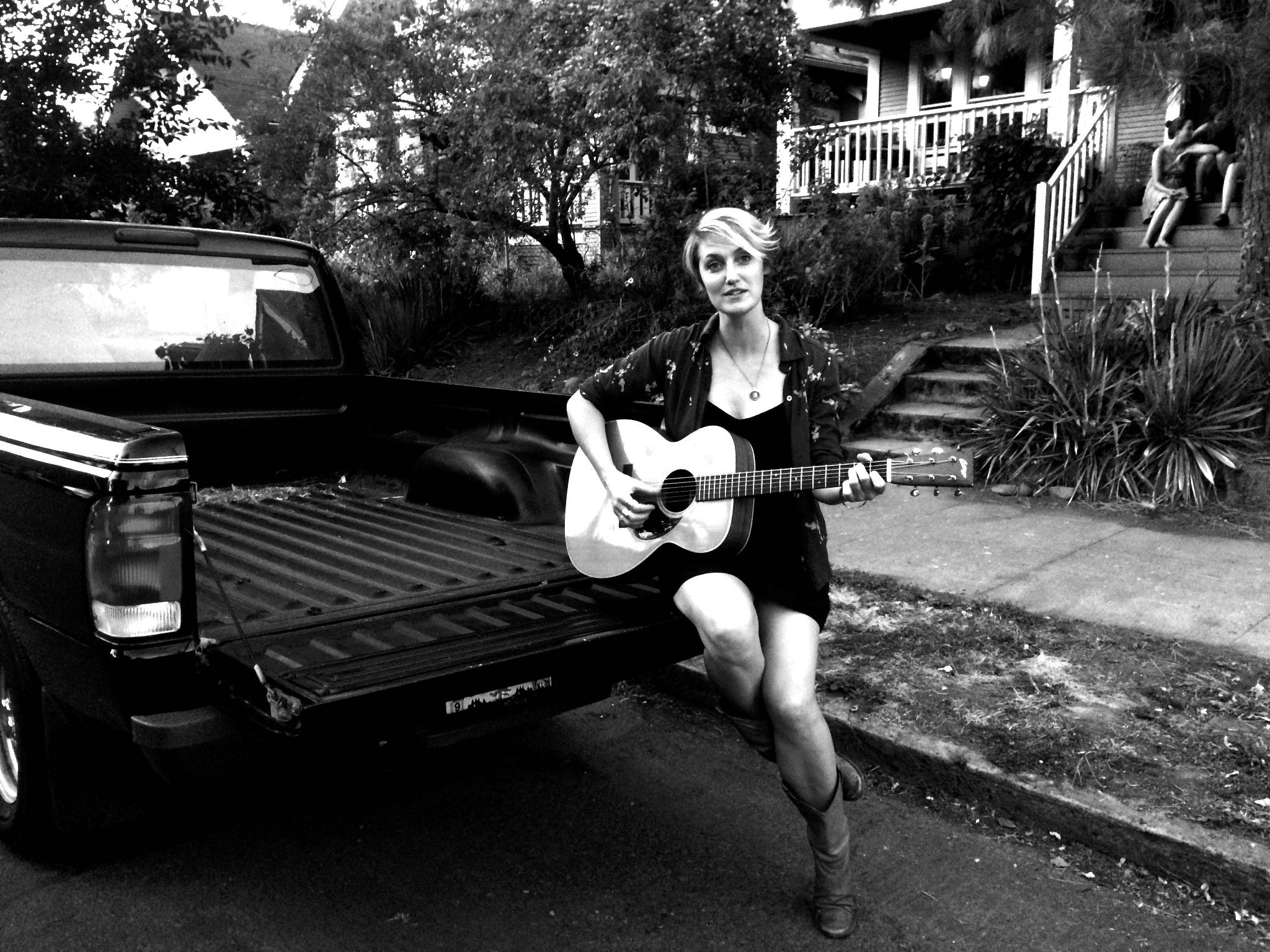After a long hot summer, the idea of a fall chill starts to sound very appealing. If you’re anything like me, you can get a massive hit of that fall feeling by catching Joan Shelley’s set Friday night at the Accord. As someone who grew up in a certain milieu — think of the constant background hum of NPR, acoustic guitar cases piled in the living room by a dusty cabinet full of LPs by the Kingston Trio, Judy Collins, and Joan Baez — there’s a certain kind of music that always makes me reach for a sweater: a single crystalline voice over a carefully plucked guitar. Shelley sings in one of the most crystalline voices I’ve heard. It brings to mind Baez or Joni Mitchell, but less trained and a little more tentative, just enough to occasionally surprise you with its power.
Louisville based singer-songwriter Joan Shelley, who also plays in traditional string band trio Maiden Radio, has released three solo albums. Her latest, Over and Even, is a masterpiece of autumnal tone. Songs like the title track are written specifically for the first frost, for clear crisp nights. “Jenny Come In” lists out the kind of simple comforts this album traffics in:
There’s food on the table
And though it is small, a bed that is clean
Music for playing and hands that are able to hold
This is music that first and foremost wants to give a feeling of calm and comfort, to soothe you and draw you into its grasp.
While Shelley’s voice is the main instrument on Over and Even, nearly equal weight is given to the contributions of guitarist Nathan Salsburg. Salsburg’s technique carries notes of John Fahey, Nick Drake, and the traditional melodic runs of the British Folk revival. His lines twist around Shelley’s lyrics, sometimes in accompaniment, other times in wry contrast, but always with a spry feeling that never draws attention to itself in a “Okay, now here’s the guitar solo” kind of way. It’s subtle and delicate, Shelley and Salsburg’s instruments playing off one another like old lovers. The diversity of his fingerpicking is easy to miss, but the album is filled with small wonders — the way the guitar sounds like drops falling from sagging pine needles on the title track, or makes the slow bobbing ripples that fill “Lure and Line”.
Just like with Shelley’s lyrics, the guitar arrangements can lull you into confusing gentleness for simplicity. However there’s a disquiet hanging beneath the surface of all these songs, the kind of wistfulness at the ending of things that comes with every winter.
“Stay On My Shore”, for instance, might at first be taken as a wistful love song. “And if you go / The wind will blow you back to me” is a common enough sentiment, and Salsburg’s arrangement recalls lapping waves. But then Shelley follows up with “And if your boat is broken out on the rocks / It wasn’t anger, but a longing”, which suggests that the departure the narrator is lamenting may be more permanent. (The song notably has guest vocals from Will Oldham, whose I See a Darkness is a good reference point for the way death interlaces the texture of Shelley’s music.) When the song reaches lines like
Rolled in the needles and wrecked our skin
Gave it all to be empty
Wrapped in leaves wet and clinging
In wreathes so holy
it blurs the distinction further between preparations for the onset of winter and death. Whether literal or figurative, the album is concerned with the idea of reaching an ending point, having to decide whether to hang on or let go, to a lover, to a season, or a body. This theme plays out further on album highlight “Easy Now”, which, to put it bluntly, is three minutes and forty one seconds of euthanasia lullaby. Shelley sings, as if to a departing friend:
Easy now
It’s almost over
The fever will run out,
Now the nights are colder
Who will lift your face
To see how the stars
Shine brighter when you’re lonely?
The song crosses back and forth between comfort and devastation, between the perspectives of departing and the departed. It offers comfort both to someone peacefully crossing over into death and to the ones left behind, “The ones that watched you wander out on the rocks / When the light of day was fading.”

There’s more hope on songs like “Not Over By Half” or “No More Shelter”. While the lyrics of the latter chronicle scattered bright spots from a continuing downward spiral, Salsburg’s picking turn it into a defiant anthem. In the chorus, Salsburg spryly picks around simple, powerful chords, to offer an uplifting counterpoint to the defeated lyrics. To reinforce the feeling, it also pulls out one of the album’s rare flashes of electric guitar, giving the song the album’s warmest production.
On her first two solo albums, Ginko and Electric Ursa, Shelley paired more traditional, stripped-down numbers with stabs at more instrumentation — the swell of strings on Ginko‘s “Siren” or the piano and electric guitar on Electric Ursa‘s “Something Small”. In contrast, Over and Even is purposefully restrained, almost hermetic at times. Bass is almost entirely absent, percussion often limited to a distant tambourine tap. Even the additional elements, like the harmonium on “Brighter Than the Blues” or the piano on “Subtle Love”, seem to slip away from reach, tiny accoutrements that take care never to draw too much attention.
Shelley may hail from Kentucky, but her music seems to come from somewhere other than the Kentucky we know. It’s less of bluegrass and rolling Appalachian hilltops, and much more of the wilder parts of Britain and Scotland (maybe it’s where Vashti Bunyan lives). To me it conjures a pastoral, fantasy Kentucky filled with wood-burning stoves and rowboats perpetually crossing under stone bridges, desolate hills and cottages nestled in faded woods. You can catch a glimpse of it in the artfully faded photograph on the cover of “Over and Even”, or in Douglas Miller’s animation for her latest song, “Cost of the Cold”.
Shelley’s type of folk music is embedded deep in the American consciousness, as deep as the twelve bar blues or the backbeat. It’s been multiple generations since the folk revival of the 50s and 60s, and we’re as far removed now from Bob Dylan on Bleecker Street as he was from the recordings on the Anthology of American Folk Music. What Shelley and Salsburg are doing with their compositions is distilling a hundred years of singing and songwriting down to something so pure it runs the risk of feeling obvious. But their songs are meant to be about pure and simple things. “Clear your mind till there’s nothing left, but two arms to lay in” Shelley sings on “Cost of the Cold”. A pair of guitar strings twang, as if to signal their agreement. For a moment, listening, the mid-September sun hides behind a cloud, and I can feel frost beginning to form on the windows.
———————
Joan Shelley is playing the Pygmalion Festival at 11:30 pm on Friday, September 16, at the Accord Indoor. Visit the Pygmalion website for more information and to purchase tickets.
About The Author:
Nathaniel Forsythe is a writer living in Champaign and a constant state of wondrous bafflement.








